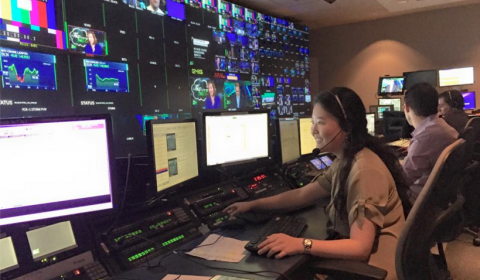 Please give a brief background on yourself and your career.
Please give a brief background on yourself and your career.
As an associate producer with Power Lunch, CNBC’s show from 1-3pm ET, I’m part of a team that makes live TV happen. That includes writing and producing segments covering business, finance and economic news.
At Wellesley, I studied International Relations, focusing on Economics. I was the executive producer of Wellesley College TV, a money and finance beat reporter for Wellesley News, and a student web producer for the Wellesley Communications Department.
How has your career changed since you originally envisioned it at Wellesley? What other careers did you consider as a student?
I knew I wanted to pursue journalism but I was not sure if I wanted to commit to broadcast journalism or focus my coverage on business and economic news. Going to Wellesley encouraged me to dream big.
How has Wellesley contributed to your career?
Instead of attending a college with a journalism program, I chose to attend Wellesley College, a liberal arts school. And it’s been the best decision I made. My Wellesley education in economics and international relations helped hone my qualitative and quantitative analysis skills. And the Wellesley environment, where every organization on campus is led by a woman, nurtures leadership. Technical journalism skills can be easily learned and picked up on the job. But the ability to think, ask the right questions, analyze a complex story and simplify it to make it understandable to your audience is a skill that is best learned at a liberal arts school.
What is a typical work day or work week like for you?
The Power Lunch team gathers for the morning meeting where we brainstorm and plan out what stories we will cover that day. I typically produce about two different guest-driven segments a day. Until 1pm, I try to book the best guest(s) for each of my segments. For example, if I am producing a segment that debates which emerging markets are the best bets for investors, I may book an analyst who is bullish on China and another who is bearish on the country but thinks there is a better opportunity elsewhere.
From there, I move into the control room. Ten minutes before the live show starts at 1pm, I’m making sure all the stock and economic charts are accurate and ready to go. For the next two hours, I’m in charge of creating and bringing up the stock charts live throughout the show. In a matter of minutes or seconds, all the planning we did for the show could be out the window. If news breaks in the middle of the show, we have to verify the facts, figure out who will report the news on air, which segments must be cancelled, what parts of the show need to be moved around, and who we can book to come on the show or call in for a phone interview for instant analysis of the story. It’s immense pressure and definitely an adrenaline rush. But it’s also extremely rewarding to be contributing to such an integral type of public service.
After the show, the team gathers to chat about how the day’s show went and to plan for the next day. For the remainder of the day, I either work on longer-term TV projects such as an investigative story, or write and report on stories for CNBC dot com. The digital platform allows me to pursue stories that we’re unable to explore on TV.
What piece of advice would you offer students looking to get into your area of interest and expertise?
Journalism is an experience-driven field. Accrue professional journalism experience through internships and seek leadership opportunities in your campus newsroom. As you meet and learn from professionals in the field, keep in touch with them as they will become invaluable resources and mentors down the road. Make sure you never forget the meaning of gratitude for those mentors that support you throughout your career.
What do you wish you had known as a student?
The majority of leading journalism companies release their applications for summer internships in the fall. Many students hold off on applying to summer internships until winter break or even later than that. If you are interested in journalism opportunities for the summer, start looking and applying as soon as the school year starts in September.
Also, join a professional journalism organization. I am a member of the Asian American Journalism Association (AAJA) that provides countless mentorships, internship and scholarship opportunities to students. AAJA welcomes all members, even if you are not Asian. I can’t imagine where I would be as a journalist without their guidance and support.
If you could come back and take one class at Wellesley what would it be?
I wish I’d learned computer science. The journalism industry is going through major transformations and learning computer science would have been a bonus in becoming more involved in the industry’s shift toward digital platforms.